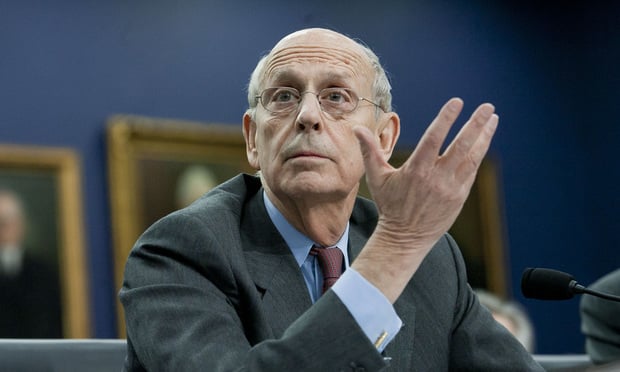'What Kind of a Statute Is That?' DOJ Faces Skeptical Supreme Court in $12B Obamacare Dispute
"Why doesn't the government have to pay its contracts like everyone else?" Justice Stephen Breyer asked at one point during Tuesday's arguments.
December 10, 2019 at 01:45 PM
5 minute read
 Paul Clement, speaking at the Federalist Society's 7th Annual Executive Branch Review Conference, on Wednesday, May 8, 2019. Credit: Diego M. Radzinschi/ ALM
Paul Clement, speaking at the Federalist Society's 7th Annual Executive Branch Review Conference, on Wednesday, May 8, 2019. Credit: Diego M. Radzinschi/ ALM
The U.S. Justice Department on Tuesday faced a skeptical U.S. Supreme Court over arguments that the government had no obligation to pay $12 billion in losses incurred by insurance companies that agreed to participate in a federal program to provide health insurance for high-risk individuals through the Affordable Care Act.
The Affordable Care Act established a "risk corridors" program stating that the government "shall pay" insurers a portion of their losses for three years beginning in 2014 if their costs were higher than anticipated. Insurers were obligated to pay a portion of any savings into the program if costs were lower than expected.
But after the insurers had performed in fiscal years 2014, 2015 and 2016, and paid into the program, Congress passed appropriation riders requiring the Department of Health and Human Services to use only funds paid into the program.
Insurers were obligated to pay into the program and the government committed to paying out "if we feel like it," Justice Elena Kagan said in one exchange to Deputy Solicitor General Edwin Kneedler. "What kind of a statute is that?"
In the cases consolidated under Maine Community Health Options v. United States, Kneedler argued repeatedly that the risk corridors program was about subsidies for insurers working in the market, and not a contract with the government. They were not working for the government, he said. "Congress can create incentives to enter a program," and there were a number of other incentives offered, Kneedler told the court.
But Kirkland & Ellis partner Paul Clement, representing four insurance companies, argued that the appropriation riders did not repeal the program and left intact a "clear and enforceable promise required to make the Affordable Care Act work."
Not paying according to the formula in the program, Clement said, was "a massive government bait and switch."
Four insurers filed damages actions in the U.S. Court of Federal Claims under the Tucker Act seeking reimbursement under the statutory formula. Three lost and one prevailed, but the U.S. Court of Appeals for the Federal Circuit subsequently reversed the one victory and affirmed the other losses.
The appellate court said the appropriation riders demonstrated Congress' intent to abrogate its financial obligation. The court said the statute did not contain language necessary to show the government intended to create a contract.
Chief Justice John Roberts Jr. questioned Clement about his clients' reliance on the government's alleged obligation to pay. "But they have good lawyers and I would have thought at some point they would have sat down and said, 'Well, why don't we insist upon an appropriations provision before we put ourselves on the hook for $12 billion?'" he asked.
Clement said insurers in 2010 relied on a "money-mandated promise." He told Roberts: "It is not the law that the government can make an obligation go away." The remedy for the insurers, he said, was to file suit in the Federal Claims court, "get a judgment, and get damages from the government's Judgment Fund."
Kneedler faced many more skeptical questions than Clement. Justice Stephen Breyer repeatedly and with hypotheticals pressed the veteran Justice Department lawyer on why the "shall pay" language did not create an enforceable contract.
 Justice Stephen Breyer testifies in 2015. Photo by Diego M. Radzinschi/THE NATIONAL LAW JOURNAL
Justice Stephen Breyer testifies in 2015. Photo by Diego M. Radzinschi/THE NATIONAL LAW JOURNAL"Why doesn't the government have to pay its contracts like everyone else?" Breyer asked. "They didn't say they wouldn't pay, just don't pay out of that fund."
Kneedler replied, "This isn't a contract." Breyer pressed again, "Why not? Why isn't it close enough?"
Kneedler argued that absent a clear statement that a contract was being formed, the statute does not state a contract. "It states a policy," he said.
Besides Maine Community Health, other insurers involved in the Supreme Court case are Moda Health Plan, Blue Cross and Blue Shield of North Carolina and Land of Lincoln Mutual Health Insurance.
The risk corridors case is the fifth ACA case to be heard by the justices since the Obama-era law's enactment in 2010. They may soon face a sixth dispute: a ruling is expected shortly by the Fifth Circuit on a group of Republican-led states' challenge to the entire law. The court is weighing a Texas trial judge's declaration that the entire law must fall.
Read more:
'Race to the Bottom': Paul Clement Questions DOJ's Anti-Obamacare Stance
Justice Dept. Spurns $12B 'Bait-and-Switch' Claims in SCOTUS Health Care Case
Federal Appeals Court Rejects Insurers' Claims for Millions in ACA Payments
Reed Smith's Sher Talks About Molina's $52 Million ACA Win and What's Next
This content has been archived. It is available through our partners, LexisNexis® and Bloomberg Law.
To view this content, please continue to their sites.
Not a Lexis Subscriber?
Subscribe Now
Not a Bloomberg Law Subscriber?
Subscribe Now
NOT FOR REPRINT
© 2025 ALM Global, LLC, All Rights Reserved. Request academic re-use from www.copyright.com. All other uses, submit a request to [email protected]. For more information visit Asset & Logo Licensing.
You Might Like
View All

'A Warning Shot to Board Rooms': DOJ Decision to Fight $14B Tech Merger May Be Bad Omen for Industry

'Incredibly Complicated'? Antitrust Litigators Identify Pros and Cons of Proposed One Agency Act
5 minute readLaw Firms Mentioned
Trending Stories
- 1Uber Files RICO Suit Against Plaintiff-Side Firms Alleging Fraudulent Injury Claims
- 2The Law Firm Disrupted: Scrutinizing the Elephant More Than the Mouse
- 3Inherent Diminished Value Damages Unavailable to 3rd-Party Claimants, Court Says
- 4Pa. Defense Firm Sued by Client Over Ex-Eagles Player's $43.5M Med Mal Win
- 5Losses Mount at Morris Manning, but Departing Ex-Chair Stays Bullish About His Old Firm's Future
Who Got The Work
J. Brugh Lower of Gibbons has entered an appearance for industrial equipment supplier Devco Corporation in a pending trademark infringement lawsuit. The suit, accusing the defendant of selling knock-off Graco products, was filed Dec. 18 in New Jersey District Court by Rivkin Radler on behalf of Graco Inc. and Graco Minnesota. The case, assigned to U.S. District Judge Zahid N. Quraishi, is 3:24-cv-11294, Graco Inc. et al v. Devco Corporation.
Who Got The Work
Rebecca Maller-Stein and Kent A. Yalowitz of Arnold & Porter Kaye Scholer have entered their appearances for Hanaco Venture Capital and its executives, Lior Prosor and David Frankel, in a pending securities lawsuit. The action, filed on Dec. 24 in New York Southern District Court by Zell, Aron & Co. on behalf of Goldeneye Advisors, accuses the defendants of negligently and fraudulently managing the plaintiff's $1 million investment. The case, assigned to U.S. District Judge Vernon S. Broderick, is 1:24-cv-09918, Goldeneye Advisors, LLC v. Hanaco Venture Capital, Ltd. et al.
Who Got The Work
Attorneys from A&O Shearman has stepped in as defense counsel for Toronto-Dominion Bank and other defendants in a pending securities class action. The suit, filed Dec. 11 in New York Southern District Court by Bleichmar Fonti & Auld, accuses the defendants of concealing the bank's 'pervasive' deficiencies in regards to its compliance with the Bank Secrecy Act and the quality of its anti-money laundering controls. The case, assigned to U.S. District Judge Arun Subramanian, is 1:24-cv-09445, Gonzalez v. The Toronto-Dominion Bank et al.
Who Got The Work
Crown Castle International, a Pennsylvania company providing shared communications infrastructure, has turned to Luke D. Wolf of Gordon Rees Scully Mansukhani to fend off a pending breach-of-contract lawsuit. The court action, filed Nov. 25 in Michigan Eastern District Court by Hooper Hathaway PC on behalf of The Town Residences LLC, accuses Crown Castle of failing to transfer approximately $30,000 in utility payments from T-Mobile in breach of a roof-top lease and assignment agreement. The case, assigned to U.S. District Judge Susan K. Declercq, is 2:24-cv-13131, The Town Residences LLC v. T-Mobile US, Inc. et al.
Who Got The Work
Wilfred P. Coronato and Daniel M. Schwartz of McCarter & English have stepped in as defense counsel to Electrolux Home Products Inc. in a pending product liability lawsuit. The court action, filed Nov. 26 in New York Eastern District Court by Poulos Lopiccolo PC and Nagel Rice LLP on behalf of David Stern, alleges that the defendant's refrigerators’ drawers and shelving repeatedly break and fall apart within months after purchase. The case, assigned to U.S. District Judge Joan M. Azrack, is 2:24-cv-08204, Stern v. Electrolux Home Products, Inc.
Featured Firms
Law Offices of Gary Martin Hays & Associates, P.C.
(470) 294-1674
Law Offices of Mark E. Salomone
(857) 444-6468
Smith & Hassler
(713) 739-1250









